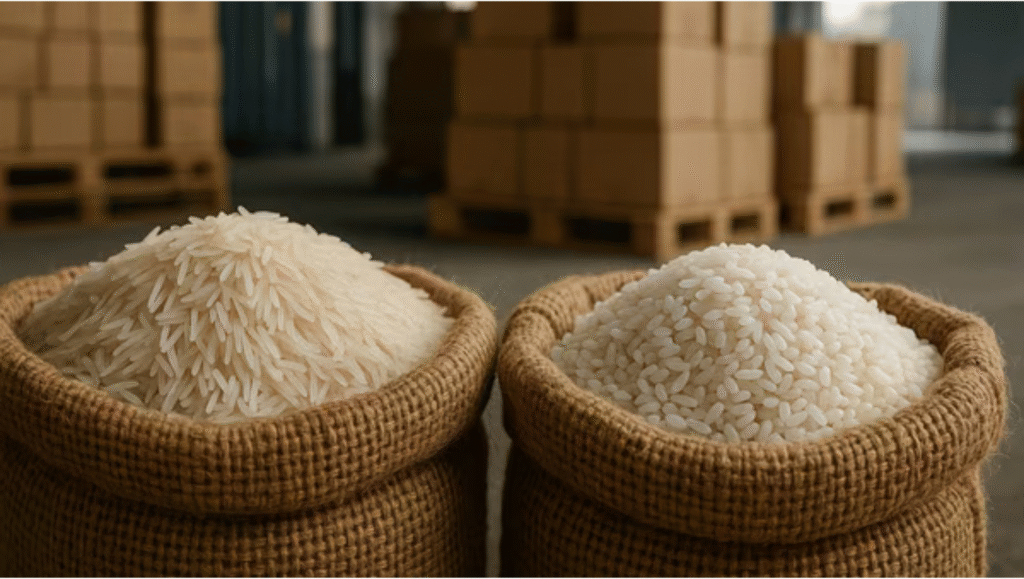Counterfeit Seeds & GI Crops like Basmati
Syllabus: Agriculture (UPSC GS III)
Source: Livemint
Context
The Government of India has unveiled a plan to tackle counterfeit and substandard seeds, which threaten GI-tagged crops like Basmati rice. The strategy includes digital seed traceability (SATHI system) and proposed amendments to the Seeds Act, 1966, aimed at safeguarding farmers and protecting India’s agricultural reputation.
Significance of GI Crops like Basmati
- Export value: Basmati contributes nearly 60% of India’s rice export earnings, strengthening foreign exchange earnings.
- Reputation marker: GI crops reflect unique agro-climatic traits and traditional practices, acting as cultural ambassadors.
- Farmer livelihood: Millions of farmers depend on GI-certified seeds for predictable yields and better prices.
- Soft power: GI crops like Basmati, Darjeeling tea, and Alphonso mango enhance India’s global image and agri-diplomacy.
The Problem: Fake and Substandard Seeds
- Seed failure: Counterfeit seeds often fail to germinate, reducing productivity and pushing farmers into debt.
- Reputation risk: Fake seeds can damage India’s credibility in GI crop exports.
- Scale: In 2024–25, 32,525 of 2.53 lakh samples tested were substandard, mostly in West Bengal, Tamil Nadu, and Madhya Pradesh.
- Illegal sales: Unauthorised sellers distribute seeds under fake labels, bypassing regulations.
- Regional hotspots: Telangana, Rajasthan, Gujarat, and West Bengal report the most cases.
Government Response
Digital Seed Traceability (SATHI Project)
- Phase I (2023): Covered 23 states/UTs for seed production and processing.
- Phase II (2025): Extends to dealers and farmers with QR codes for authentication.
Seeds Act Amendment
- Current law allows uncertified “truthfully labelled” seeds.
- Proposed changes mandate certification and traceability, holding dealers and companies accountable.
Seed Testing Infrastructure
- 178 Seed Testing Labs (STLs) nationwide; 10 NABL-accredited, 2 ISTA-accredited, ensuring quality and global compliance.
India’s Seed Industry
- Market value: $6.3 billion (~₹55,200 crore), one of Asia’s largest.
- Projected growth: $12.7 billion by 2028; $20 billion by 2040.
- Private sector dominance: 98% in cotton, ~70% in field crops/vegetables.
- Public-private synergy: ICAR research develops varieties; private sector handles large-scale dissemination.
Challenges
- Enforcement gaps: Raids and FIRs exist, but counterfeits persist.
- Farmer vulnerability: Small farmers often lack awareness of certified seeds.
- Logistics: Traceability requires robust digital and physical supply chains.
- International credibility: Fake seeds can lead to export rejections.
- Equity gap: Smaller companies may struggle with compliance costs.
Way Forward
- Universal digital traceability: Expand SATHI across all states with farmer training.
- Legislative reform: Amend Seeds Act; impose stronger penalties.
- Awareness campaigns: Educate farmers on certified seeds and dealer accountability.
- Stronger penalties: Criminal liability and licence cancellations for counterfeiters.
- Public-private collaboration: Joint R&D in blockchain traceability; expand accredited labs.
- Global branding: Promote GI crops with authenticity certifications internationally.
Conclusion
Counterfeit seeds threaten farmers’ incomes, exports, and India’s agricultural credibility. GI crops like Basmati hold economic, cultural, and diplomatic value. With digital traceability, legal reforms, and farmer awareness, India can protect its seed sovereignty and strengthen its global standing.











